
Welcome to the fifth installment of Overdue Books, the bi-weekly column where your faithful reviewer saves money by reviewing only graphic novels and trade or hardcover collections he found at his local library (though if any publishers would like to cure this with the addition of a stunningly Irish name to their comp list, Michileen Connor Martin would not object), and hopefully saves his loyal readers some time and money by advising them in regards to their funnybook habits.
This week’s column is brought you by the letter E. E is for Epidemiology, Endocrinology, Echo & The Bunnymen, Etch-a-Sketch, Edward I, Edward II, and that tyrannical bastard Edward III.
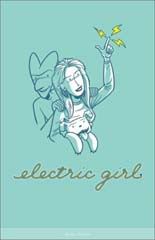 Electric Girl, Vol. 1
Electric Girl, Vol. 1Script and art by Michael Brennan
Published by Ait/Planetlar; $9.95 US
Virginia was gifted not only with electrical powers at birth, but an unwanted butt-headed gremlin invisible to all save the Virginia and the occasional four-legged friend. Along with her unerringly cute dog Blammo, the mischievous Oogleeogg, Virginia goes on adventures where she meets talking dogs, vengeful yet mild-mannered dead people, robots, and super-powered tree-huggers in Electric Girl, Vol. 1.
But don’t be fooled by her electrical powers. Virginia’s just a girl trying to keep on her father’s good side, have a little fun, and occasionally fight off pre-K supervillains.
I must be getting old. Upon reading the first few stories of Electric Girl, my thoughts were preoccupied with the question, “What age group are these stories for?” The dialogue led me to believe, at first, that it was a children’s comic. But after a few near-miss profanities (e.g. “Oh, SH-“), and a scene that while not gory or even gross under Brennan’s care – Virginia’s dog happily wagging his tail as he presents her with the rotting hand of a dead man – I was a little less sure.
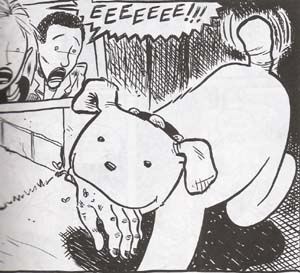
Eventually, around the same time as the aforementioned dead hand story – in which Virginia and her friend Monique help a pair of zombie lovers get back at the fast-food chicken restaurant that killed them – I was hooked.
With his curvy, minimal style, Michael Brennan is sure to keep a smile on your face throughout this collection. Electric Girl is light-hearted, yet occasionally snarky. It’s funny and irreverent without being cruel, cute without pandering, childlike but not one-dimensional, and adult-minded without neglecting younger readers.
Part of its diverse appeal is that you’re never quite sure what part of Virginia’s life you’re going to visit. Each chapter features Virginia both as a pre-pubescent and in her college years. There’s three chapters per issue, including a “silent” issue that’s either completely free of dialogue, or gives readers pictures in the dialogue bubbles rather than words. All of the stories are stand-alones and so the shifting of timeline doesn’t hurt the narrative.
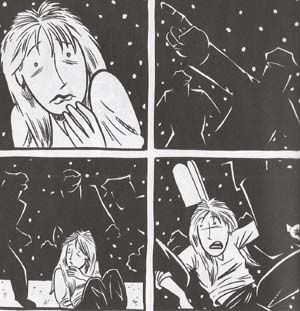
Despite my initial concerns, I can’t imagine anyone having a problem with their kids enjoying this delightful collection, nor can I imagine this grown-up declining to check out the following two volumes of Electric Girl at the first available opportunity.
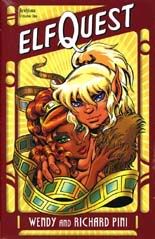 ElfQuest Archives, Vol. 1
ElfQuest Archives, Vol. 1Script by Wendy and Richard Pini, art by Wendy Pini
Published by DC; $49.95 US
Reading ElfQuest makes me feel like an Elvis nut at Woodstock. I was there, but my mind was just tuned out of everything that was going on.
It’s regrettable how many great comics I missed out on when I was younger – particularly considering I was reading funnybooks at precisely the time people like Alan Moore and Frank Miller were breaking all the rules – in favor of my monthly doses of Hulk Smash!
When I read the third volume of Alan Moore’s run on Swamp Thing last year, I came across a scene in which a chubby, half-naked vampire devours his human mother, and instantly remembered coming across the same scene in my brother’s comic collection. Here was the series I currently consider to be one of the most important in the history of superhero comics, and I passed it over because it scared me. I’m pretty sure, too, that someone showed me Watchmen when it came out. I’m also fairly certain that I read the first issue, and without any recognizable heroes or stunning fisticuffs, I kept politely silent about how much it bored me.
Likewise, upon reading ElfQuest after all these years, I remembered reading the first two issues (once again in my brother’s collection). Scenes like Cutter angrily lashing out at an offending cactus, only to reveal that it stored the water he and his friends desperately needed, jogged my memory. I remember watching the Wolfriders raid Sorrow’s End, stealing not only food and water but the dark-skinned Leetah. My younger mind, not being able to consider morality in any complex way, couldn’t understand how I was supposed to like characters who stole and kidnapped, even out of pure hunger. Spider-Man would’ve kicked their asses if he’d been there!

Luckily, ElfQuest Archives allowed this reader to appreciate the stories retrospectively, now that his stomach is both hardier and takes up quite a bit more space. It reprints the first six issues of ElfQuest, with an introduction by fantasy author Mercedes Lackey, an afterword by Wendy and Richard Pini, a black-and-white cover gallery, color treatments of various characters, and black-and-white reproductions of pages left out of the body of the collection. This last piece was particularly nice, and I can’t help but wonder why this method hasn’t been adopted by more sequential art collections, particularly in the cases of old superhero reprints. Upon reading the deleted pages, you realize they were left out of the body of the story because they served only as introduction to the characters and exposition about previous stories (preamble that wouldn’t be necessary for those reading six issues uninterrupted).
Perhaps most surprising about ElfQuest is how naturally the story unfolds. In the beginning Cutter and his Wolfriders are burnt out of their forest home by fanatical human tribesmen, retreat to the troll caves where they’re tolerated only because of the trolls’ cowardice, and led astray into a burning desert. Eventually they find Sorrow’s End, where they try to forge a new home with another, less feral group of elves. The Sorrow’s End stories are the most interesting for me, because despite the fact that it’s the most idyllic setting the heroes find, the writers keep them there. It seems a common practice of adventure fantasy storytelling to keep the characters the hell AWAY from places where they’re happy and relatively free from danger. It would be something akin to Tolkien keeping Frodo and the Fellowship in Rivendell for much longer than he did, but still sending them on adventures while they were there. The drama at Sorrow’s End isn’t about swords or sorcery, but about the clash between two cultures. It’s one of the things that distinguishes ElfQuest from lesser fantasy fiction; particularly the kind that puts the elfishness of the elves and the dwarfishness of the dwarves (or the Klingon-ness of the Klingons) before the humanity of them all. The elves of ElfQuest are interesting as people, not just as role-playing game fodder.
Unlike Tolkien’s epic, there are women in ElfQuest. Lots of women. And to a superhero comic book reader who’s used to the complex exploration of gender leading to nothing more than tight leather and heavingly unsupportable breasts, ElfQuest offers one of the more multifaceted explorations of gender role in comics and fantasy fiction.
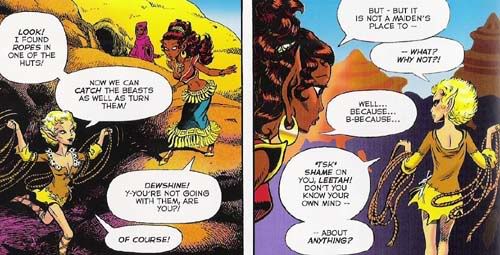
In “Voices of The Sun,” we find that women are on more or less equal terms with the men in the Wolfrider ranks. Except for those caring for children, any woman can participate in hunts or other dangerous exploits. While women, on the other hand, are not shown to be particularly servile among the Sun People, Leetah the healer faces a problem that could easily be compared to arranged marriages. Elves have secret “soul names,” and if one elf knows another’s soul name – not by finding out through earthly means but simply because they somehow know - it is said the two are soul mates. To the Wolfriders, when it is revealed that Leetah knows Cutter's soul name, she has no choice but to submit to Cutter’s will. For Leetah, it isn’t as simple. At the same time, Wendy and Richard Pini don’t let us believe the Wolfriders are backward savages and that the Sun People are somehow more enlightened. Leetah’s absolute bewilderment at the idea of Wolfrider women participating in battle or hunting shows the dichotomy isn’t as simple as who’s backwards and who’s not. It’s not a comparison that rockets the women’s right struggle forward fifty years, but compared to most comic book and/or fantasy fiction, it’s pretty startling (in a good way).
Along with being put-off by a morality I couldn’t initially comprehend as a child, the characters that looked more like bobbleheads than anything else led me to believe that I wasn’t missing much, that the story was silly and childish. I was a stupid, safe bastard. The simple and fluid narration, expressive art, and complex characterization renders ElfQuest one of the most impressive pieces of fantasy fiction in comic book form, matched only by Gaiman’s Sandman.
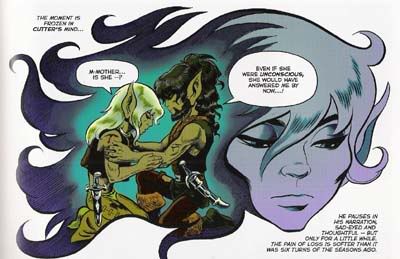
It’s an example of how this library-diving thing isn’t always beneficial to my wallet. While these stories have been printed in cheaper, softcover collections, I can’t imagine spending money on anything less than this beautiful hardcover edition.
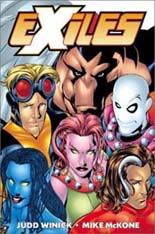 Exiles
ExilesScript by Judd Winnick, Art by Mike McKone
Published by Marvel; $12.95 US
Brought together from conflicting timelines, the Exiles must hop through alternate realities, fixing whatever went wrong so that their own continuities can be made right again. Taking its cue from Sliders, Exiles features worlds where something in Marvel continuity went awry. For example, on their first journey they encounter an Earth on which all super-powered individuals have been hidden away in prison. On their second they visit the Trial of Phoenix, where the heroes must ensure that the event unfolds in the same tragic way as in the MU proper.
Exiles's biggest appeal seems to be that in spite of the fact that it started in the Jemas era, it was allowed to incorporate a broad view of the Marvel Universe beyond the characters of the home title. Ironically, one of the only havens for those who despised the Jemas/Quesada abandonment of the "continuity mud" specifically focused on continuities that never occurred anywhere outside Exiles.
I've enjoyed some of Winnick's other superhero stuff, particularly Green Arrow, but one of his weaknesses in the genre is that - try as hard as he might - he isn't good at mixing light, snarky humor with serious drama. He tries hard to get us to care, particularly as he kills off whole rosters of alternate versions of Marvel characters, but from the get-go he never made us believe there was anything serious about the story to begin with. He doesn't spend any time convincing us his heroes are experiencing the natural confusion and disbelief such characters would suffer from after being thrown into such a ridiculous situation.
And speaking of killing people off, that seems to be the crux of the drama here. Like What If...? and Kirkman's Marvel Knights 2099 one-shots, the emotion revolves around the unsurprising and annoying tendency to kill off alternate version of licensed characters. It's utterly predictable and, since none of the corpses in question are the "real thing," who cares?
And while we all know by that big "X" that this is just another X-men spin-off, could we be just a little less blatant, please? Out of the endless possibilities of characters to re-model for such a concept, the only ones chosen are X-men (apparently Professor Charles Xavier’s dream of peace between mutantkind and humankind has something to do with Scott Bakula and
Maybe Exiles has gone above and beyond since this first volume, but if I bother to check out subsequent volumes, it'll be with my library card. Not my credit card.
